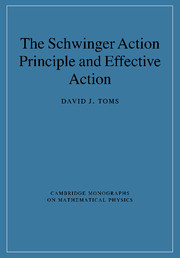Book contents
- Frontmatter
- Contents
- Preface
- 1 Action principle in classical mechanics
- 2 Action principle in classical field theory
- 3 Action principle in quantum theory
- 4 The effective action
- 5 Quantum statistical mechanics
- 6 Effective action at finite temperature
- 7 Further applications of the Schwinger action principle
- 8 General definition of the effective action
- Appendix 1 Mathematical appendices
- Appendix 2 Review of special relativity
- Appendix 3 Interaction picture
- Bibliography
- Index
5 - Quantum statistical mechanics
Published online by Cambridge University Press: 27 October 2009
- Frontmatter
- Contents
- Preface
- 1 Action principle in classical mechanics
- 2 Action principle in classical field theory
- 3 Action principle in quantum theory
- 4 The effective action
- 5 Quantum statistical mechanics
- 6 Effective action at finite temperature
- 7 Further applications of the Schwinger action principle
- 8 General definition of the effective action
- Appendix 1 Mathematical appendices
- Appendix 2 Review of special relativity
- Appendix 3 Interaction picture
- Bibliography
- Index
Summary
Introduction
In our treatment of quantum mechanics we discussed the notion of the state of a given system. The state was specified by giving the eigenvalues of a maximal set of mutually commuting observables. This represented the most information we could have about a given system in principle. In practice, of course, we do not really have all of the necessary information about the eigenvalues available. No experimentalist sets out with the primary intention of obtaining results which correspond to a maximal set of mutually compatible observables for any macroscopic system, such as a gas. Even a very small volume of gas contains an enormous number of particles. The quantum mechanical state would require us to know a great deal of information about the internal states of the electrons and nuclei of the gas molecules. The experimentalist may only be concerned with gross properties such as the pressure, internal energy, or specific heat for example. Most of the detailed information about the detailed state of the system is neither observed, nor of direct interest. Instead we must content ourselves with a description of the average, or most likely, behaviour of the system in the probabilistic sense. The usual technique for doing this consists of the introduction of an ensemble, meaning a very large collection of systems whose measured macroscopic properties are the same as those for the system we are interested in, but whose unobserved properties can vary.
- Type
- Chapter
- Information
- The Schwinger Action Principle and Effective Action , pp. 208 - 237Publisher: Cambridge University PressPrint publication year: 2007



